Melania Trump Funny on Hands and Knees on Oval Office Desk
Kellyanne Conway Is the Real First Lady of Trump's America
On the third floor of the West Wing, one flight past the stairwell portrait of President Donald Trump talking on his Android phone, is an office once occupied by Valerie Jarrett, senior adviser to Barack Obama; Karl Rove, senior adviser to George W. Bush; and First Lady Hillary Clinton. By cramped White House standards, it's an expansive space, complete with a desk, a conference table, a couch, a bookshelf stocked with a single copy of The Art of the Deal, a duffel bag full of family photos and a couple of pairs of Spanx — and, through the blinds, a view of the Washington Monument. And on this February day, its current tenant, Kellyanne Conway, was explaining how her life had changed in the nine months since she joined the campaign of the man who would ultimately become the 45th president of the United States — for one thing, she now answers to "Blueberry."
That's because she's one of the only officials in the White House, other than President Trump and Vice-President Mike Pence, to have Secret Service protection — which staffers receive at the special request of the president, who has famously referred to her as "my Kellyanne." She got the protection, Conway said, after she was sent a suspicious white substance. And then there were the threats. "Most of them are online," she remarked, "and most of them are very explicit and graphic, and they're sometimes people who have a history of following through but for whatever reason weren't prosecuted."
As a child, Conway picked berries in southern New Jersey, where the acidic soil once served as a lab for botanists attempting to tame the wild bushes. In 1984, when she was 16, she was crowned Miss New Jersey Blueberry Princess (the girl who was crowned Miss New Jersey Honey Queen told a local paper she planned to grow a "bee beard" by sitting a queen bee on her chin and waiting patiently while the rest of the hive, who gravitate to the queen, crowded around on her face). Later on, Conway would earn the distinction of World Champion Blueberry Packer, for the alacrity with which she packed the berries into crates. So when the Secret Service told her to pick a code name that began with B, "I was like, 'Well, that's easy!' " she said.
Conway laughed with her assistant, a 26-year-old College Republicans alum named Catharine Cypher, as she tried to explain the absurdity of hearing the stoic armed men who follow her around refer in all earnestness to the whereabouts of one Miss Blueberry: "It's kind of embarrassing!" In the supermarket, they trail her and speak into their wrists: "They're like, 'Blueberry, horsepower, aisle four!' I'm like, Seriously? Once in a while, somebody will come up to me in the aisle and they just sort of hasten their gait and say, 'You oughtta be ashamed of yourself! You oughtta look in the mirror!' And I'm like, 'I'll get right on it! Mirrors, aisle eight!' " She laughed. More often, she said, she finds herself encountering fans. "All the women coming up to me: 'My mom's gonna die if she hears you're in the grocery store!' Well, how else would I eat?"
"I'm on the Blueberry email," Cypher chimed in, referring to the Secret Service alerts that document Blueberry's every move. Conway's eyes bulged cartoonishly. "I've never seen it!" she said. "Show us! I've never seen the Blueberry email!" Reading the emails, the women began cracking up. "Blueberry: arrived LGA." More laughter. "Blueberry: arrived Crown," Crown being Secret Service–speak for the White House. Cypher noted that, over the weekend, she knew her boss's every move. "There's too much information!" Conway said, laughing. At the airport, she said, "all I wanted to do was get coffee and pee. I definitely can't get coffee if I don't pee — trust me, I gave vaginal birth four times." But who wants to bring a guard into a public restroom? "Oh my God, there's no privacy! It's crazy, it really is crazy." And it can get complicated. "I have two friends, who both — well, one is Ann Coulter. She started dating her security guard probably ten years ago because she couldn't see anybody else," Conway said. "And you know Rebekah Mercer?" she asked, referring to the Republican megadonor who, with her father, Robert, bankrolled Trump's campaign and pushed to install Conway as its campaign manager. "Her younger sister, Heather Sue, married her security guard. She was like, 'Well, I didn't see anybody else, so one night, I, you know, I invited him in!' " Conway's got a running joke about one of her own agents. "If Blueberry has an affair, it's with Secret Service! It's with Joe." She deepened her voice to mimic his: " 'Ma'am? Blueberry, horsepower!' " (Coulter and the Mercer family did not respond to multiple requests for comment.)
Blueberry knows that she has had a breakout year. As Trump's highly visible and quotable campaign manager during the election's final sprint, she became a constant presence on cable news and thus a subject of widespread fascination, armchair psychoanalysis, outrage, and exuberant ridicule. But rather than buckling, she absorbed all of it, coming out the other side so aware of how the world perceives her that she could probably write this article herself.
Watch the video to see how Kellyanne Conway effectively dodges interview questions.
Caricatures from that time, when hardly anyone believed Trump could defy the polls and win, depicted her wielding everything from a whip to a shock collar to tame her unruly candidate. But these days, serving as the senior counselor to the president, Conway is becoming less a supporting character than a bona fide celebrity in her own right. She is simply more famous — more beloved by Trump fans and more hated by Trump detractors — than anyone in any comparable role in any previous White House. And so she has become a complicated symbol for both sides; recently, when a photo of her wearing a mini-dress and sitting on her knees on a couch in the Oval Office went viral — leading a Democratic congressman to say she looked "familiar" in the position — it set off debate among feminists over whether a woman like Conway, who many believe is harmful to their cause, deserves sticking up for in the face of sexism. Personally, Conway claims to be sick of herself. But she's also clearly having a lot of fun being the center of attention in what's surely the strangest era in modern political history.
On January 20, the day of Trump's inauguration, Conway turned 50. Up close, she looks like a glamorous mosquito, five feet and six inches of wiry limbs and buzzing energy wrapped tightly in colorful shift dresses by Alexander McQueen or Sandro — today a short-sleeve royal-blue number with leather accents, a rhinestone necklace, and black-and-beige stilettos. ("President Trump doesn't like frump," a similarly done-up Omarosa Manigault, the Apprentice contestant turned White House staffer, explained recently in the East Room.) Conway had settled down to chat with me one day in mid-February as she skimmed some notes and readied herself for a TV appearance, which she claimed would not be treated as an opportunity to get her opinions through to the president, despite the "audience of one" theory that many have used to explain the cable hits she and other members of the administration so often make.
"When I want to talk to him, I go talk to him," she said, emphasizing that she has "walk-in privileges," meaning she can waltz into the Oval Office unannounced. "Eighty-five percent of what I discuss with him will never be revealed. It's like any other boss–C-suite-employee relationship. I don't need to talk to him through the TV. I just go in and talk to him." This idea is very important to Conway, and she returns to it often — that she is as close an adviser to the president as there exists in the White House and can bend his ear at any time. (The following day, I asked her via text message if something I'd seen on Twitter was true — that the president had recently unfollowed her. She told me no, that she thought he'd never followed her in the first place — then she asked the president himself. "Hold on," she texted, complaining all the while that the topic was "small ball." In real time, I watched the president's "following" list jump up by one. "I asked if he had unfollowed, convinced he had never followed. He has 30m followers and follows like 42 people!" she wrote. "Now 43.")
After hair and makeup, she made her way down the narrow staircases of the West Wing and into the briefing room, which was mostly empty. A cameraman approached and asked Conway to stand on a rectangular wooden box decorated with the NBC peacock, about five inches off the ground, so she could meet the camera's gaze. She gave a quick ten count, confirmed that she could hear audio from New York, and started talking. "Yes, General Flynn does enjoy the full confidence of the president," she said. "This is a big week for General Flynn. He's the point of contact for many of these foreign visits. If you look at the official schedule, today you had the prime minister of Canada, Justin Trudeau, here."
Pressed further, she repeated her answer. "Does he have the full confidence of the president? Yes, he does," she said.
When the segment was over, her stern smile gave way to a look of serene confidence. "Thanks for having me," she said into the microphone. "How's the baby? Send me a new picture!"
She stepped off the platform and turned around to discover that a small scrum of reporters had formed at her back. "Hey, Kellyanne! Did you say 'full confidence'?" one asked.
"About 18 times," she said. The reporter raised his eyebrows.
"About 18 times," he said. "Okay."
Conway smiled. "Should I do it in French since the prime minister was here?"
Everybody laughed, vying for her attention: "Kellyanne! Kellyanne!"
She began making her way toward the doorway. "I don't do the press briefings," she explained. "Sean does!" Walking into a small office space behind the briefing lectern, she could see that her words had already made their way to various cable-news chyrons, which thrilled her. "And there it is!" she said, looking at the TV. " 'Conway: Flynn has the confidence of the president!' " She let out a giddy laugh. "Quoted in real time!"
A few minutes later, leaning on her desk, she looked at her iPhone, with its giant font and banner alerts, and noticed that news had broken that Flynn had extended an apology to Pence. She mumbled the headline aloud. "Hmm," she said. "Did we really need to put that out there?" She ate a few pieces of cinnamon-flavored Orbit, the gum of choice of Sean Spicer, who's technically the public face of the new administration, though Conway was first floated as an obvious pick for press secretary. Asked if she would ever want his job, she rolled her eyes. "Slit my wrists, bleed out, put cement shoes on, jump off the bridge, and then I'll take the job — are you kidding me?"
Delivering absolute assurances about the gainful employment of the national-security adviser just before he was forced to resign might have torpedoed anyone else's communications career. After all, what she said wasn't skillful obfuscation; it was just wrong. "On that one, she was definitely not in the loop. She was never envisioned to be in the loop," Steve Bannon, the president's chief strategist, told me. "Quite frankly, I was a little surprised when I saw that." Conway's interview had taken place in the afternoon, around 4 p.m., and it only took an hour for Spicer to come out and cast doubt on what she'd said. Just after 10 p.m., Flynn resigned.
In her capacity as Trump's spokeswoman, Conway has said many incorrect things. During the campaign, she repeatedly insisted that her candidate had brought an end to birtherism, the conspiracy claiming that Barack Obama was not born in America, rather than launched his political career with it. There was her claim that the White House's grossly inflated estimates about the size of the crowd at the Mall were "alternative facts"; the fictional "Bowling Green Massacre," which she cited at least three times; and her suggestion, which she later said was taken out of context, that the Obama administration may have conducted unlawful government surveillance on Trump Tower via microwaves. It has been a nine-month run breathtaking in its audacity, with Conway demonstrating an almost freakish facility with falsehoods.
But the Flynn episode was particularly dramatic, since her comments were not just at odds with public perception but with the high-stakes decision-making inside the White House — meaning it made Trump Kremlinogists wonder just how close to the center of power she really was. And yet Conway did more than just survive that brief humiliation. In the time I spent observing her and talking to her over the past several weeks, her mood rarely seemed anything other than elated — perhaps because of how many people she encountered, wherever she went in Washington, who greeted her like a hometown hero. Her notoriety seemed only to help her standing with the president, who has kept her as a trusted adviser and the White House's most recognizable avatar on the outside. By March, she was less a pollster, campaign manager, or communications guru and more what the press expected Ivanka Trump would become in the absence of Melania Trump, who remains in New York with her young son, Barron — a pervasive female double of the president, an extension of his will and much more fiendishly committed to her boss than anyone else working on his behalf. Fewer than 50 days into the new administration, Conway had become almost inseparable from the public's idea of the Trump White House. That is, the functional First Lady of the United States.
The simplest explanation for that is Conway's eerie similarity to the president: her opportunism, jumping from Ted Cruz to Trump mid-campaign; her mercenary sense of loyalty, somehow both total and totally for hire; her ease at projecting, in even the most staged encounters, a blue-collar authenticity; her fighter's instinct, which dictates that she never give an inch or even try to persuade; and, above all, her very loose relationship to the truth and her very evident love of the game. Other Trump surrogates, like Reince Priebus or Sarah Huckabee Sanders, get weaselly under pressure, as did their predecessors in previous administrations. But in intense interviews with Jake Tapper or Chuck Todd, you can usually see Conway winking and smiling, in much the same way her boss seems amused by the theater of a press conference even as he's staging one. Other presidents would have been ashamed to have their representatives spin such bullshit, to have them so dismissively refuse to engage with interlocutors about contrary facts or commonsensical presumptions. But Trump doesn't appear to feel shame, not in his communications strategy nor in any other part of his life. And Conway has become his most convincing doppelgänger by not feeling shame either.
Even so, the Trump staff's first "You're fired" was rocky for her. "On that day, he made a decision at the hour, whatever it was, five o'clock, and said, 'This is how I want to handle this,' " Spicer, leaning back on a chair in his White House office, told me. "This is a guy who makes big decisions when he's ready and then he tells his team." Had Conway's interview been "30 or 40 minutes later …" he said, trailing off. "What people sometimes don't appreciate is you're answering on behalf of somebody whom you're speaking for, so you're representing their point of view, the issues that they care about, and that's a very different thing than answering for yourself. I think sometimes people might look at a television interview and there's an obvious answer to something, but because of what you know, or because of the direction something's going in, or because of the discussions that may be coming up, you can't answer it in the easiest way because you know things about how the issue is gonna evolve or a meeting that might be coming up or a piece of information that you can't share that makes it more difficult to answer in a way than someone who's just sitting at home watching understands."
"The way we roll is, things are thought through in a smaller group and people are brought in as they need to be brought in for input," Bannon explained. "I think it's a pretty good way to manage things. There's a tendency, if you get too broad too quickly, either things can leak out or it's just not as tight as you can roll, and I think the General Flynn thing was that. It was obviously embarrassing to her, and the media immediately jumps on it because, look, no offense, the media, let's be honest about it, it's a lot like junior-high school." (Bannon himself attended an all-boys military school.) "It's a 'who's in, who's out.' It's all of this snarky stuff."
But the degree to which a senior White House official is "in," when the job, in part, is to communicate the president's thinking to the general public via the media, is rather important — as members of the media, already warring with Conway, were quick to point out. "Anybody who pretends I'm not smart or not credible, it's like, 'Excuse me, I've spoken 1.2 million words on TV, okay?,' " Conway told me before the Flynn mishap. "You wanna focus on two here and two there, it's on you, you're a fucking miserable person, P.S., just whoever you are."
Besides, as everyone in this chaotic White House will tell you, when it comes to this president, having all the facts all the time is virtually impossible. "It's very hard to be in the Trump loop," one former Trump adviser said, both owing to his "unpredictable" personality as well as the "insular nature of his senior staff." (About the president's perspective on the staff scrambling and turf wars, another adviser, who has known Trump since the 1990s, added, "I don't think the president cares. I think he likes the infighting. I think his attitude is, let's see if you're tough. Let's see who's tough.") Being informed, then, is a matter of proximity — which explains why, unlike on most campaigns, Trump's managers and strategists traveled the country with him on his private Boeing 757, for fear that staying behind in the Trump Tower war room could mean losing their influence. "There is kind of a circle-the-wagons mentality, and if your wagon's out of the circle for a while because you've gotta go do something, you're out of the loop," the former adviser said. "In the Trump White House, that can happen to anyone the moment you're outside of the inner circle physically." As Bannon said, "I do think it was a little overplayed when she was quote-unquote the Trump whisperer. There's no Trump whisperer. There's just not. It doesn't function like that. He doesn't absorb information like that. Everybody that's looked at as a Trump whisperer? It's always meant to demean him."
For her part, Conway calls Bannon the White House's "man of mystery" — joking that you can't constantly jockey to be next to the president and remain invisible at the same time. "I tease him a lot. I told him in December or November, 'You realize I go on TV to defend you more now than Donald Trump? So while you're sound asleep and my husband is trying to master how to flip a pancake, I'm actually defending you.' " Not that it matters to Bannon. "I tell her, I tell everybody: I could care less if you defend me," he told me. "I don't want to be defended, because I don't care." When the White House learned Bannon would appear on the cover of Time, Conway told me, people were "running around the West Wing" frantically trying to figure out what to do. "Like, who's ever out there for me? Or even Sean? It's like, you can't be in every photo and then wonder why you're an object of media fascination. And then because you're in every photo, people are like, 'Oh, those who aren't in the photo must be — ' " She trailed off. "How about if we're the ones working? How about the five computers on my desk?" (There was only one computer on her desk.) "Everybody draws the wrong conclusions, I think."
Maybe not everybody. From the #MAGA side of the political spectrum, where Trump still has enormous support, Conway has become a kind of loyalist hero, more visible than Jared and Ivanka and more deeply committed to the singular cause of Trump than Bannon, who sees himself as part of a global nationalist movement, and Priebus, who is self-preserving in the grand tradition of Establishment operatives. To judge by her reception at the Conservative Political Action Conference, an annual assembly of Republicans that takes place at the Gaylord National Resort and Convention Center in National Harbor, Maryland, she might as well be a second president, mobbed by reporters and conservatives young and old, who turned around and walked backward to take selfies as she made her way toward the escalators. "We're on Snapchat!" a woman told her excitedly as she moved sideways, angling her camera at her face. "Thank you for saving the world," a man said. "Oh," Conway said, "we're just getting started."
Backstage, she found her way to a television monitor that projected an image of the empty, gleaming stage where Sean Hannity would soon walk out to hype up the crowd that had assembled for a pre-tape of his Fox News show, telling them to "text Mom and Dad and Grandma and Grandpa," because they might soon be visible on TV. "You're gonna have a rock-and-roll time and a lot of fun," he said. "Kellyanne Conway is out there with us!" At the mention of her name, screams and applause erupted so loudly that the stage seemed to vibrate, prompting her to throw her head back and curl her mouth into a broad grin, the glow of the monitor reflecting off her teeth. To her right stood Sebastian Gorka, a radical anti-Muslim activist and deputy assistant to the president who would also appear with Hannity (and who more recently has gotten into trouble for a reported affiliation with a Nazi group). Conway was wearing the same red-and-black cocktail dress she'd modeled on Election Night, when she appeared onstage at the Midtown Hilton and beamed at the crowd, Bannon and Chris Christie beside her. When Trump was done delivering his victory speech, he had walked slowly away from the lectern, shaking hands and stiffly hugging members of his staff and family. When he arrived at Conway, she wrapped both her arms around his neck in an almost maternal embrace.
"The counselor to the president," Hannity said, winding up his introduction, "and, might I add, the first woman in American history to ever be a campaign manager of a winning campaign!" The crowd cheered, cutting him off, then broke into the sort of chant usually reserved for politicians, athletes, and musicians, not pollsters turned presidential advisers: "KEL-LEE-ANN! KEL-LEE-ANN! KEL-LEE-ANN!" Hannity took a seat across from her and joked, "What's new? Anything happening lately?"
After the interview (highlight: "I have a lot of faith in the wisdom of the American people; they can go and pull information themselves"), she snaked backstage and into the hallway by the greenroom, past a door labeled STARS ONLY. She was, she complained, cold and hungry — two things she says she frequently is. That news sent Cypher off, against Conway's protests, looking for a cup of hot tea to solve at least one of the problems. Meanwhile, Ian B. Walters, a musician and the American Conservative Union's communications director, approached with his infant daughter, Violet, who was born the weekend of the Republican National Convention in July. Conway, whom Walters referred to as "Aunt Kellyanne," squealed at the sight of the child, scooping her into her arms and cooing. With every flash of a camera in Conway's direction, Violet squinted her little eyes helplessly. "Remember what I said at the convention?" she asked Violet's father. " 'She could be the first female president.' The job's still open!" A young woman then interrupted, shaking and on the verge of tears. "It's been my dream to meet you, honestly," she said. "Aim higher," Conway said, laughing.
Arriving at the CPAC cocktail party in the hotel penthouse, she was immediately surrounded again. "We're so proud of you," a woman told her. "I love your dress," another said. "That's so cute! Red's my favorite color." Conway told the woman she'd worn it until early in the morning the day after the election — a night she's happy to revisit again. "My phone rang at 2:30," she said. "Huma Abedin! My husband took a picture of it. I'm like, 'Hey, Huma!' And she said, 'Hey, Kellyanne, how's it going?' I'm like, 'It's … going! What's up?' " She laughed. "She goes, 'Um, Secretary Clinton would like to speak to Mr. Trump.' I said, 'Would that be now?' She said, 'If he's available.' 'He's available!' And I said to Mike Pence, 'I hope she concedes, because John Podesta had been on TV saying, "We'll see you tomorrow." ' I'm like, Tomorrow?" She turned to me. "Screw the tea," she said with a smile. "I'm getting wine."
Horrified critics of the president are often surprised to find that, in person, it's very difficult to dislike Conway. With her airy voice and cheeky sense of humor, she's charming and magnetic almost in the manner of a particularly gifted retail politician, and without the alien creepiness that actually being a politician sometimes requires. She's a chronic oversharer (one with top-secret security clearance) who will let you in on the most intimate details of her existence in casual conversation. She's also pathologically social, her life a hamster wheel of meetings, briefings, appearances, interviews, events, and cocktail parties — something that separates her from someone like, say, Bannon. "I have enough friends," Bannon told me. "I'm not doing this to have friends. I don't socialize a lot, I don't bring people into my life. This is like being in the Navy, this is like a duty. I don't enjoy this every day. This is not living; this is a kind of existence."
Conway was definitely enjoying herself at Lupo Verde, an Italian restaurant on 14th and T, where she and Cypher found their way to a table I was sharing with a friend and sat down across from us. I'd invited Conway on a whim and didn't expect her to show, so by the time she arrived with her entourage, the entrée we had ordered to share, a steak, was sitting on the table. Conway gestured to the plate and asked if she could have some. "Sure," we said, "of course." She then reached her hand across the table and, rather than the steak, picked up the roughly seven-inch-long decorative scallion resting on top. Then she tilted her head back and put it in her mouth, like a sword swallower on Coney Island or a snake eating a mouse. About ten minutes later she remarked that she thought it was a piece of asparagus.
Conway's unusual unaffectedness may be explained by her childhood, which she spent in the small town of Atco, New Jersey, raised by her Italian mother, Diane; her grandmother, Antoinette; and two aunts, after her father, a truck driver, walked out. "I didn't know, unless you had to clean the bowl, why you would ever lift the toilet seat up," she recalled. But even surrounded by strong women, identifying as a feminist didn't occur to her back then. She described her home as "apolitical," defined more by "patriotism" and "religion" than talk of elections or the issues of the day. "In the 1970s, it was very active on the college campuses," she said of feminism, "and nobody in my family went on them." She did, however, idolize Mary Tyler Moore, whose show she watched every week. "I just remember thinking Mary Tyler Moore was really cool, but not because anybody sat there and said, 'She's a feminist!' I just thought she was composed and stylish and had a big smile." She laughed. "Now she would have to be, like, a brain surgeon at NASA who's vice-president of the United States on the side, adopting babies from faraway lands."
When I suggested that Conway conflates feminism with misandry, the hatred of men, she said she didn't know the term. She's careful to define her own brand of "conservative feminism" as "softer" and "less anti-male" and "less pro-abortion" than the feminism practiced by the women wearing pussy hats to protest the president. "I don't object to other people marching at all — you know, my friends were there," she explained. "But I'd rather do than march; I'd rather act than talk." Still, Conway, a pro-life advocate who spoke at the March for Life in Washington the week after the inauguration, says she would never judge a woman for getting an abortion and does not dispute, in an interview, my suggestion that she wouldn't want to see Roe v. Wade overturned. She is, she explained, "sympathetic" to any woman who makes the decision to terminate a pregnancy. "Do I know anybody who ever got an abortion? Well, of course I do. I've driven them there. I've helped pay." (She later said she couldn't recall the exact details. She had been a teenager, she said.) "You know, when you're young, you're thinking about the person, not the issue," she said. "We were younger, and I was focused on her, not on the larger public policy." What she disagrees with is what she characterizes as the liberal position of wanting abortion to be accessible to "anyone, anytime, anywhere." She added that "one goal" she has is "to make us culturally — not politically — culturally more sensitive to the value of life."
Watch: Kellyanne Conway Has Had a Lot to Say About Abortion Over the Years
By the time she was in college, at Trinity-Washington University in D.C., Conway was interning for the late New York congressman and free-enterprise evangelist Jack Kemp, also a mentor to Speaker of the House Paul Ryan. Michael Caputo, who advised Trump's campaign for a time, told me he met the young woman then known as Kellyanne Fitzpatrick in Kemp's congressional office. She was, he said, "moving the molecules" of the Republican Party, even in that minor job. "Some people minded making the copies and getting the coffee," she told me. "I always felt like, when I delivered the coffee, I had a question to ask to the person who was receiving it. Or a statement to make about something I'd read in the Washington Post that day. And when I would fax something — I mean, that's what we'd do back then — when we'd fax something or copy something in 1987, I would read it and I would learn." She momentarily practiced law after graduating from George Washington, but soon gravitated toward polling. She worked for Frank Luntz, the "public-opinion guru" known for using dial tests to determine which specific words appeal more to voters, and, in 1995, recognizing that there was money to be made in advising corporations and politicians from a female perspective, she founded her own business, the Polling Company. But even though her focus was women, her client list skewed decidedly fringe, including hard-line anti-immigration groups long disdained by the Republican Establishment and the anti-Muslim extremist Frank Gaffney Jr.
By the advent of the pundit-industrial complex in the late 1990s, she was already famous-for-Washington: quoted as an expert on the desires of the female electorate, profiled by JFK Jr.'s George magazine, rumored to be romantically involved with the now-deceased senator from Tennessee Fred Thompson (something she told me was not true), and crassly dinged by Bill Kristol's The Weekly Standard for being part of "a new class of Washington-bred cigar-and-martini bimbos." Those were primarily Conway, Ann Coulter, Laura Ingraham, and Arianna Huffington (who was then a conservative). "Being a liberal is no longer fashionable," Conway told the Atlantic Monthly in 1996, just before the impeachment mania that made partisan punditry so entertaining. "It went out with bell-bottoms. We're never going to be Stepford Democrats. Most of us make Ayn Rand look like a leftist." Asked about that statement now, she looked embarrassed by her younger self. "That comment is a bit naïve and certainly inaccurate," she said, emphasizing that she's not a libertarian but a "social conservative" as well as "a national-security conservative" and "an economic conservative — that's really what motivates me."
Along with her contemporaries, she regularly appeared on cable and Bill Maher's Politically Incorrect. "She was sort of everybody's favorite conservative at the time because she was wicked smart, very funny, and eminently reasonable," Bill Press, who co-hosted CNN's Crossfire, told me. She was the kind of pundit, he said, who would call "a dumb idea a dumb idea" regardless of which political party produced it. "When I see her today, I just think, What happened?" he said. "She's morphed into the dragon lady and says stuff which is just unbelievable. She's certainly a different person today than I knew back then."
Conway was surrounded by photogenic strivers, but unlike her peers, she didn't attain mainstream celebrity in the '90s. At one point, she told me, she arrived at a baby shower she was supposed to host with Huffington only to find that Huffington had fled town at the last minute to appear on television in Los Angeles. (A spokesperson for Huffington said this was "untrue.") And as Coulter and Ingraham became niche starlets, too, Conway focused on her company and personal life. In 2001, Kellyanne Fitzpatrick became Kellyanne Conway when she married George T. Conway III, a lawyer who'd represented Paula Jones in her case against then-President Bill Clinton (and who is now reportedly being considered to run the civil division of the Department of Justice); they'd been introduced by Coulter, who did a reading at their wedding. For most of the past decade, they've lived in Alpine, New Jersey, a tony suburb on the edge of the Hudson River (where a string of hip-hop stars, including Sean Combs, Mary J. Blige, and Lil' Kim, have also lived), with their four kids, including a set of fraternal twins, who now range in age from 7 to 12. When people come over, she joked, they "either get really excited and want to have kids or it's, like, the best birth control of your life, like, 'I am breaking up with my boyfriend right now! He's not allowed to look at me!' "
Since Election Day, Conway's role as a give-no-ground professional woman and mother of four has made her a contested symbol of the state of sexism in American public life. The New York Times used criticism of her appearance — lobbed mostly from Twitter trolls — to declare misogyny "a bipartisan exercise," while Jezebel wondered, "What Do Feminists Owe Kellyanne Conway?" In conversation — with women especially — she's happy to complain about her treatment, going down a list of what she perceives as sexist slights. "Nobody would ever ask a father of four, 'How the hell are you gonna do this job?' They would never. No one would ever ask my husband, 'Oh my God, you missed a birthday party? You missed honor-roll breakfast?' They would never." But in other contexts, she uses motherhood to insulate herself from criticism. On Hannity, discussing the drop-off in the frequency of her TV appearances, she said, "I don't think I have to explain myself if I'm not gonna go on TV for a week if I'm out with four kids for three days looking at houses and schools. A lot of my colleagues aren't trying to figure out how to be a mother of four kids, I assure you." The crowd cheered in fervent understanding.
What outrages many feminists on the left, of course, is her relationship with the president. Trump called her "baby" onstage at an inauguration ball, an incident that barely ranks in the collection of plainly sexist sins he's committed and that are now so well known that I don't need to repeat them here. But, according to Conway, her boss is "the most surprising rejoinder to what I have found to be sexism in the Republican Party," adding that he is "very pro-woman" and "protective" of the women he knows. She herself has known him for years, since a 2006 condo-board fight at the Trump World Tower, where Conway and her husband lived. The board wanted to remove Trump's name from the building; George took the other side and was shortly thereafter offered a spot on the board, which Kellyanne assumed instead. But in the 2016 primaries, she found herself working for the super-PAC of Texas senator Ted Cruz, mostly thanks to the Mercers, who had been patrons to Cruz before getting behind Trump. She was a brutal surrogate for Cruz, calling Trump "vulgar" and "unpresidential" and repeatedly insisting that he release his tax returns. About that: "We litigated this through the election," she says now. "People don't care."
Joining the Trump campaign, then, was a dramatic about-face — or it would've been, had Conway and Trump not shared so many qualities. Having cycled through his first campaign manager, Corey Lewandowski, Trump was in the process of cycling through a second, the "campaign chairman" Paul Manafort, when Conway agreed to join Bannon to run the campaign in mid-August. At the time, there was talk of impending electoral disaster, particularly since Trump was struggling with the female electorate. "The fact that she was a woman coming into that position was an added boost," Jason Miller, the campaign's communications director, told me. Bannon and Conway were not just kindred anti-Establishment spirits, they also had a kind of shared cause; since the 2012 election, Conway had grown increasingly focused on immigration, arguing that the divide between leadership Republicans and grassroots conservatives on the issue was crippling the party. "She's still the principal linkage for the grassroots, conservative base that's been around for a long time that's very different from this kind of populist, nationalist movement that's sprung up over the last couple of years," Bannon told me. And on the trail, with both of them in Trump's ear, things changed immediately. "It really brought a whole new level of aggressiveness and focus on the media side," Miller remembered. "It's a combination of being fearless and being smart, and connecting with the president at a personal level — they really like each other, that's obvious." Which created opportunities, like when she jumped in during debate prep to tell Trump that an answer a male adviser was suggesting he give on abortion was "offensive."
Soon after the release of the Access Hollywood tape in October, wherein Trump says he can "grab" women "by the pussy" and get away with it, "because when you're a star, they let you do it," Trump was scheduled to be interviewed by ABC News' David Muir. What he really wanted to do was to cancel the interview and head out to Fifth Avenue outside Trump Tower, where his supporters had accumulated in solidarity. The campaign was split about how to proceed, but Conway sided with Trump and, once he'd decided, accompanied him downstairs. "It was a pivotal moment in the campaign," one source said, and, what's more, "a big inflection point" for Trump, who realized he could get away with acting on his own instincts, even when that meant shivving the mainstream media and ignoring the advice of veteran politicos. And his campaign manager came out of the episode with her bond to Trump strengthened.
Conway, Bannon told me, is "Broadway Danny Rose — you know, that Woody Allen movie where he was the agent for every kind of vaudeville lounge act, and he'd stick with these people forever?"
So what is Kellyanne Conway's job, exactly? She's the counselor to an uncounselable man, a spokeswoman for an administration whose message changes day to day, hour to hour. Almost exactly a month after our first interview, I found myself back in the West Wing, sitting across from Conway as she ate her lunch of eggplant Parmesan and steamed broccoli from the White House cafeteria. Asked to explain her unique role, she at first took offense at the question — suggesting that Kushner or Bannon would never be asked such a thing. Later, after our conversation had concluded, she asked me to return to her office so she could answer me more completely. After Election Day, she told me, she sat down with the president-elect to figure out what she wanted to do. If she joined him in the White House, she told him, she'd support "whatever it is you want me to support in the portfolio" in addition to acting as a surrogate. If she remained on the outside, she said, she'd work on behalf of his agenda through a political nonprofit group, television, and speeches. "He knows I was offered life-changing amounts of money," she told me. What Trump asked her was " 'Well, which one is more prestigious?' And I said, 'Well, that's easy. Being in the White House is more prestigious.' " Besides, however Trump had phrased the proposition, she felt that she "owed it" to him.
With the president holed up in the White House, separated from his wife and sons, and nostalgic for the energy and camaraderie of the campaign trail, Conway's familiarity is a comfort. She's often the only senior staffer who'll indulge his preference for fast food and even accompanied him after his joint-session address to Congress for burgers. And by all accounts, including Conway's, he encourages and enjoys her television presence; he'll make suggestions for shows she should do, topics she should broach. She is, after all, a compelling character — something Trump, who confoundingly remains an executive producer on Celebrity Apprentice, values. And it's the acts of rhetorical contortionism she performs on his behalf that really demonstrate her value to the White House and mark its break from previous administrations: not just a tendency to spin, but a much more radical Overton-window exercise, by which the White House tries to move the terms of any particular debate by refusing to accept any of the media's premises at all. When Conway refuses to give in about crowd size, what she's doing is establishing the terms of future debate in the administration and casting some epistemological doubt on anything she is being asked about. There is an element of true-believer-ness in many of these confrontations, probably, but it also makes for exceptionally shrewd strategy, especially given how little the White House believes its real supporters trust Conway's interlocutors rather than the voice of the Trump administration itself.
Of course, to hear Conway tell it, nothing that nefarious is going on at all. She shrugs when asked about the inaccurate things she's said. The Bowling Green Massacre? She meant to say "Bowling Green masterminds," she told me, referring to the would-be terrorists who were apprehended before they staged an attack. And alternative facts? "Two plus two is four. Three plus one is four. Partly cloudy, partly sunny. Glass half full, glass half empty. Those are alternative facts," she said, further defining the infamous phrase as "additional facts and alternative information."
But Conway bristles when she feels public perception of her influence is confined to the idea that she's a mere mouthpiece. In conversation, she is eager to explain that she's in important meetings, important events, and privy to important information. In recent weeks, she's hired her own staff, including Cypher and a chief of staff, Renée Hudson, the wife of Richard Hudson, a Republican congressman from North Carolina, and focused her energies on broadening her portfolio — the list of projects and issues she'll be most involved with, primarily as a messaging authority rather than a policy director (though in this administration, as in previous ones, those roles can get mixed up). Among her causes are the opioid epidemic, which has her collaborating with Christie; the GOP health-care plan, which she's been talking up on right-wing talk radio; and veterans issues. She told me she's even taken the lead on arranging opening-day pitches (at the Polling Company, she advised Major League Baseball) and the production of the Trump mannequin in Disney World's Hall of Presidents, which she said was her "favorite" as a child. Her office, now two months into the administration, is beginning to look more like a place of permanence, decorated by those photos of her kids that had once been in a duffel bag on the floor as well as photos of her with the president. There are even a few more computers on her desk.
But her main job remains playing media foil, which can mean punching bag, and often results in Conway herself being the story. So be it. During the daily briefing on Tuesday, she sat off to the side of the press secretary's podium, writing in a notepad and looking up periodically — even winking at me once. "Does the president believe that he was surveilled through microwaves and televisions?" a reporter asked. "I think there's pretty sound evidence that the microwave is not a sound way of surveilling someone, and I think that has been cleaned up. It was made in jest, so I think we can put that to rest," Spicer said.
Things you buy through our links may earn New York a commission.
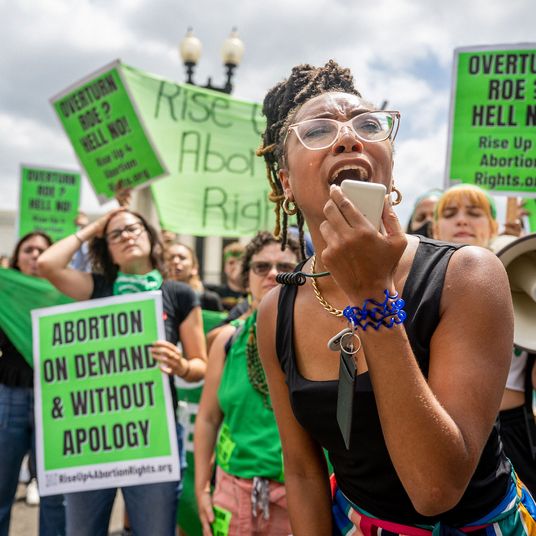
life after roe
Outrage, Uncertainty, and Instant Abortion Bans After R oe v. Wade Overturned
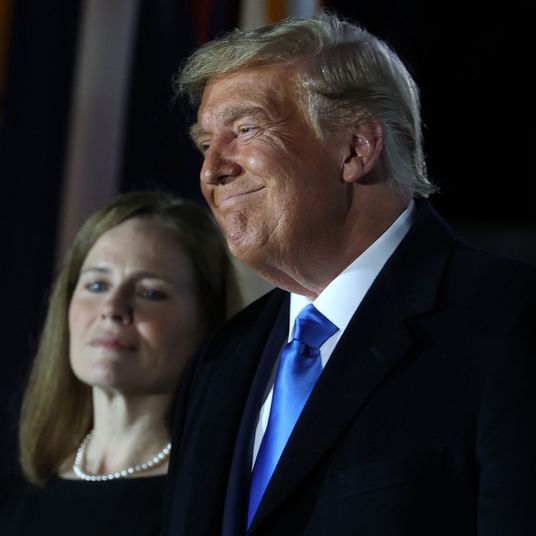
life after roe
No, Trump, God Didn't Overturn Roe v. Wade
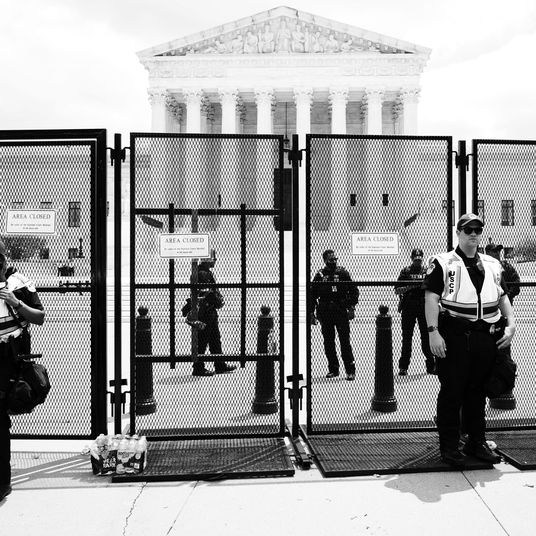
life after roe
Overturning Roe Is Just the Beginning
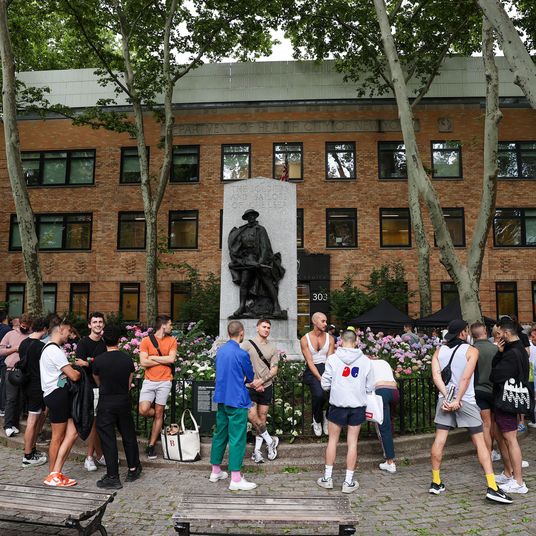
public health
New York's Belated Monkeypox Vaccine Drive Is a 'Recipe for Disaster'
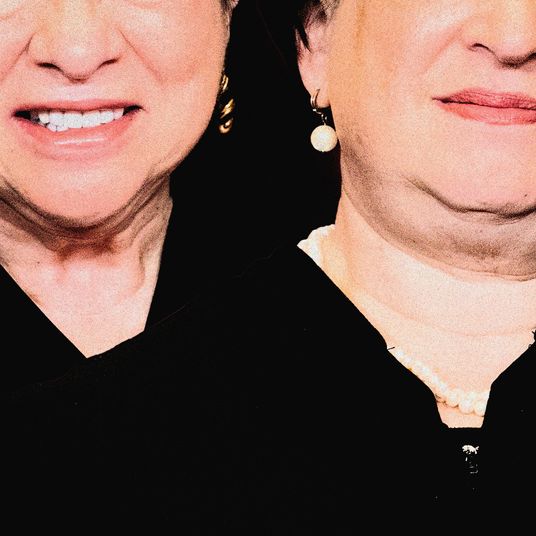
abortion
The Dissenters Say You're Not Hysterical
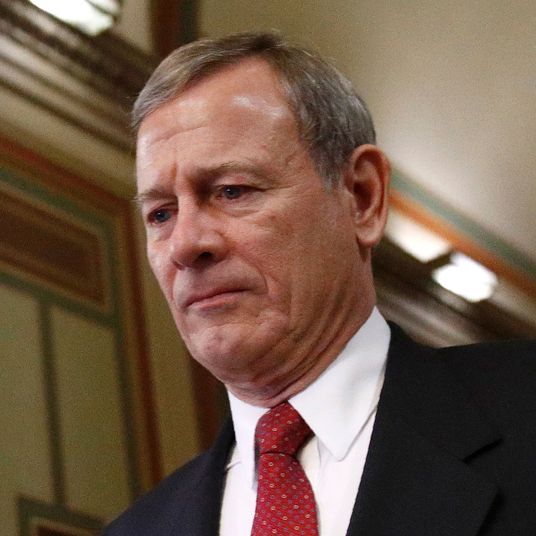
life after roe
John Roberts Had a Vague Plan to Only Half-Kill Abortion Rights
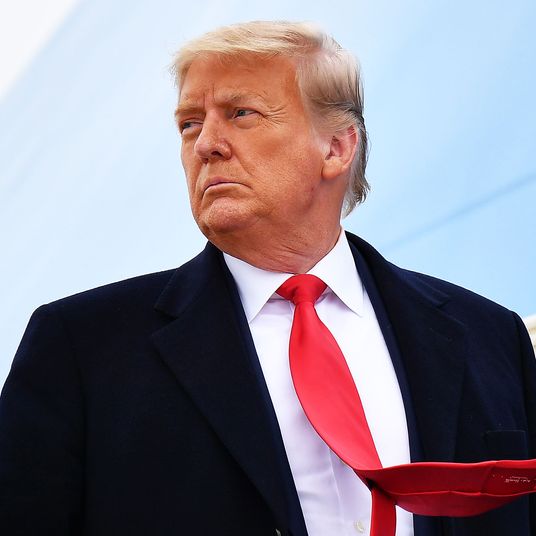
life after roe
The End of Abortion Rights Is Trump's Big Payback
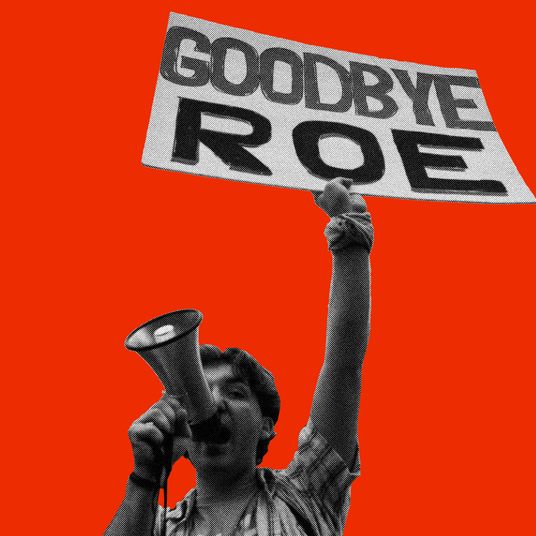
the national interest
Now We See What Happens When Social Conservatives Take the Wheel
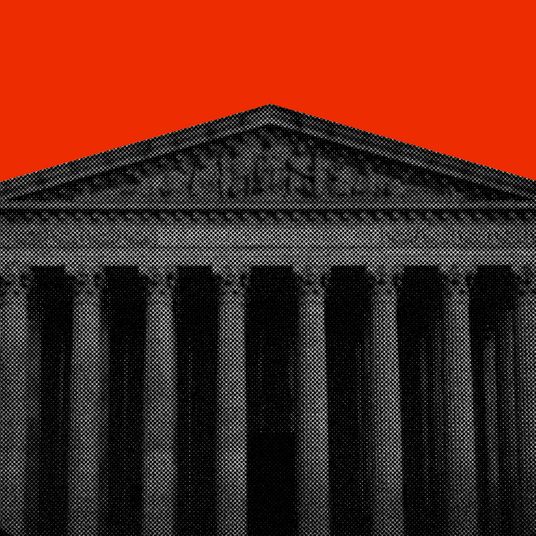
abortion
The End of Abortion As We Knew It
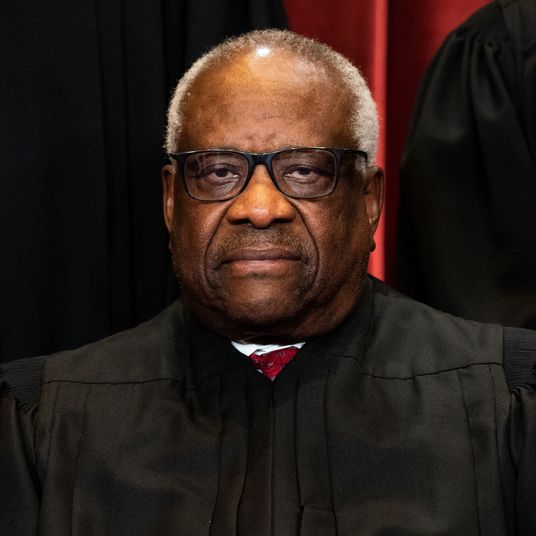
life after roe
Clarence Thomas Threatens Contraception, LGBTQ+ Rights Could Be Next to Go
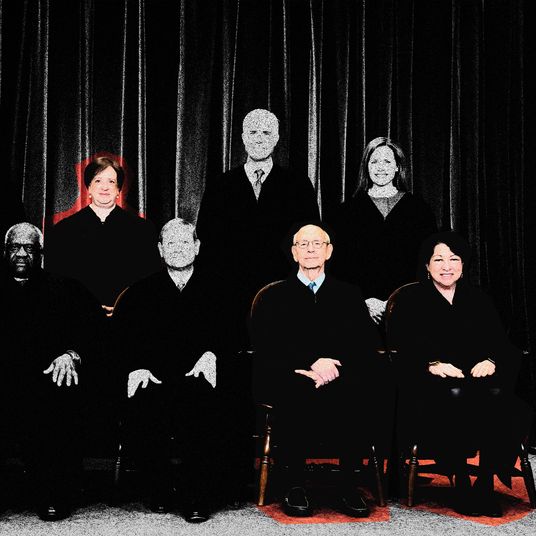
life after roe
'A Woman Has No Rights': Read Liberals' Supreme Court Abortion Dissent
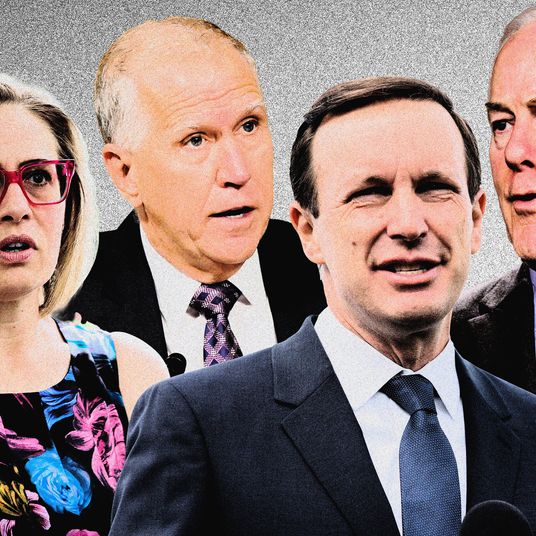
the inside game
How 4 Senators Finally Got Bipartisan Gun Control Done
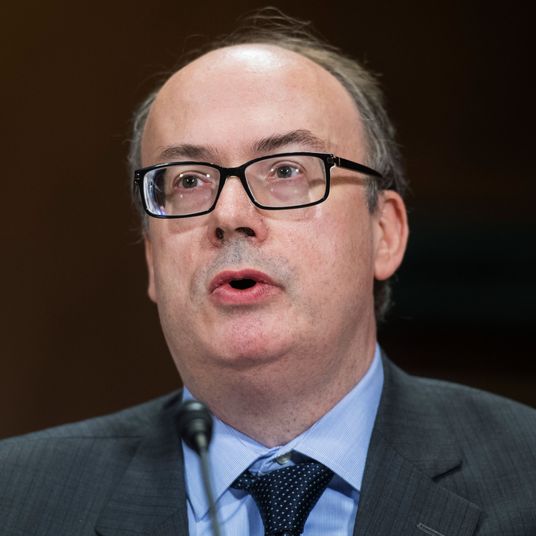
early and often
How Trump Found the One Justice Department Lawyer Willing to Steal the Election
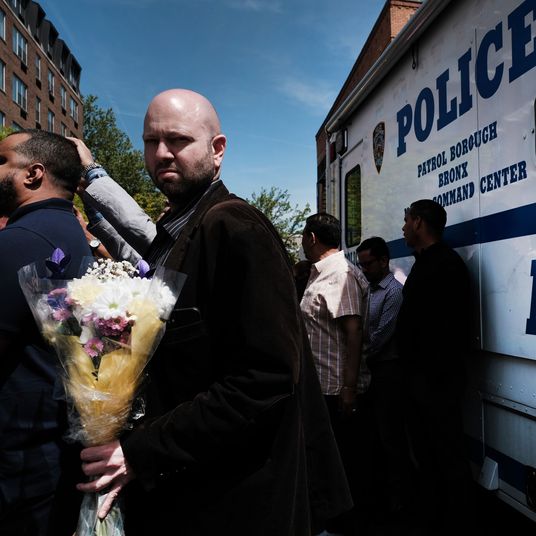
early and often
The Supreme Court Gun Ruling Could Lead to More Violence
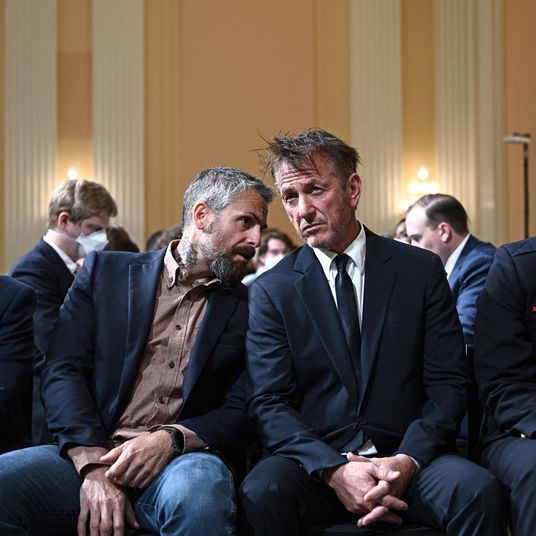
early and often
Is That Sean Penn at the January 6 Hearing?
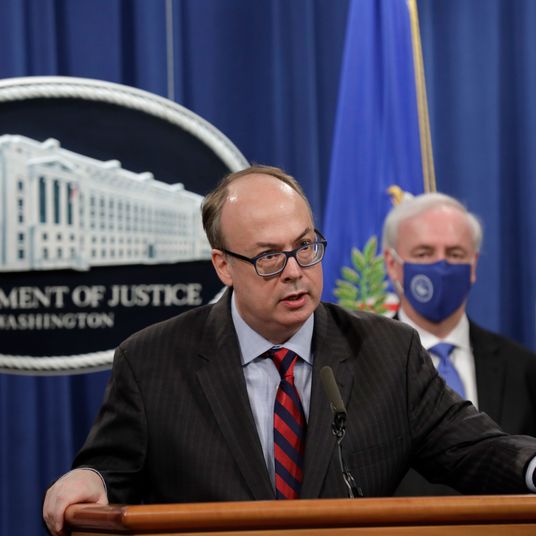
politics
Authorities Raid Home of Jeffrey Clark, Trump DOJ Official
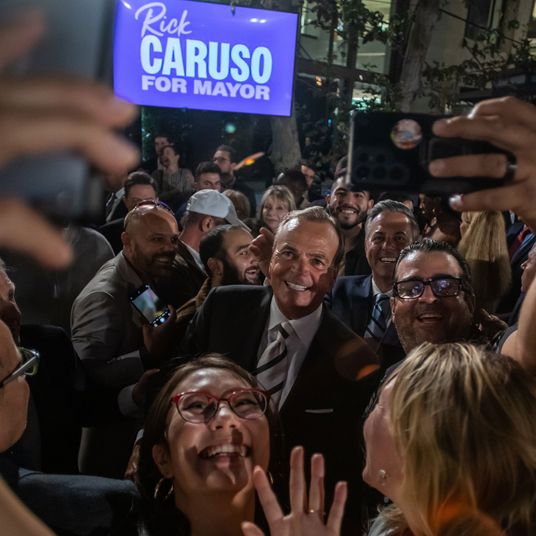
2022 midterms
California's Law and Order Narrative Didn't Survive Late Returns
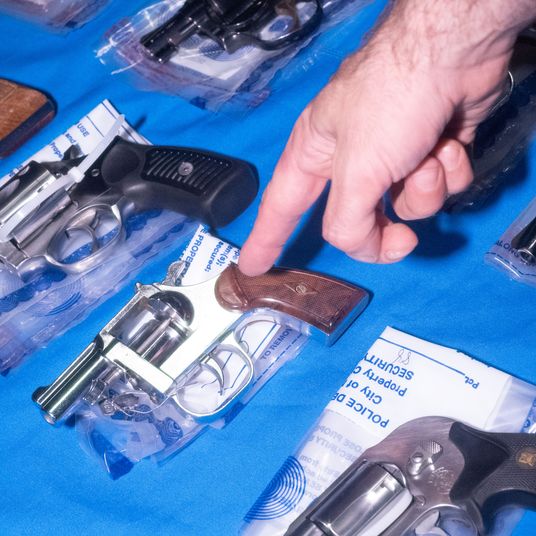
early and often
The Supreme Court Has Endangered the Future of Gun Control
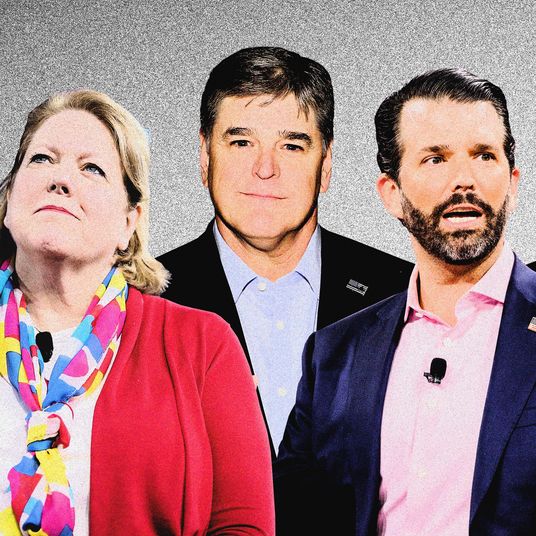
early and often
The Wildest Revelations From the January 6 Committee
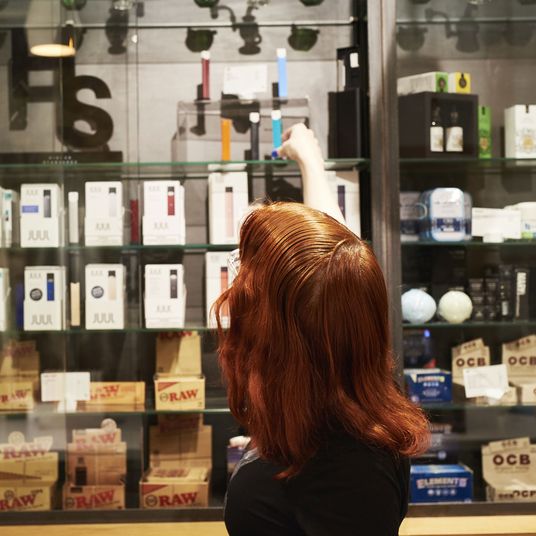
vices
FDA Orders Juul to Stop Selling in the U.S.

the national interest
Why Ron DeSantis Can Beat Trump in 2024

profile
Mark Manson, the Self-Help Guru Who Burned Out
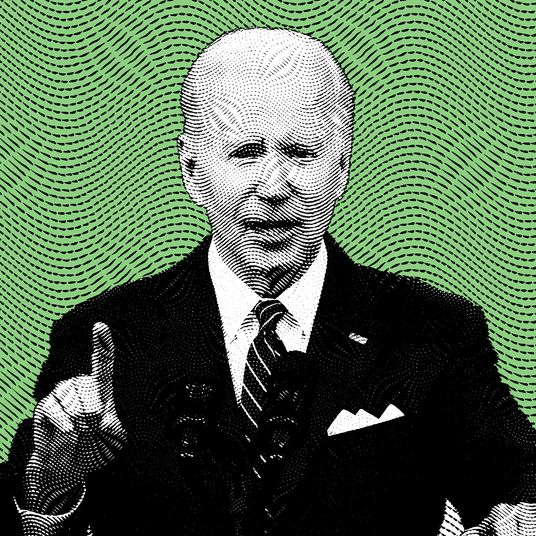
the money game
Joe Biden, Oil Man
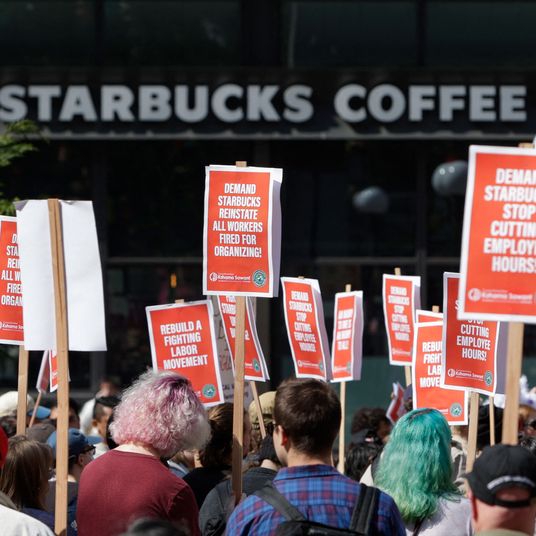
the picket line
The National Labor Relations Board Takes On Starbucks
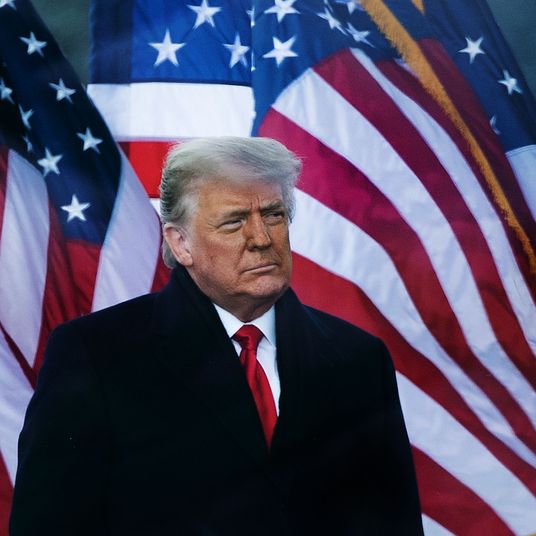
explainer
Trump's Long Campaign to Steal the Presidency: A Timeline
Source: https://nymag.com/intelligencer/2017/03/kellyanne-conway-trumps-first-lady.html